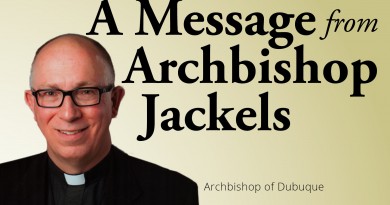Church teaching on the death penalty changes
On 1 August 2018 our Holy Father Pope Francis changed Catholic teaching on the death penalty. The text presently found in paragraph 2267 of the Catholic Catechism will be replaced with the following:
“Recourse to the death penalty on the part of legitimate authority, following a fair trial, was long considered an appropriate response to the gravity of certain crimes and an acceptable, albeit extreme, means of safeguarding the common good.
“Today, however, there is an increasing awareness that the dignity of the person is not lost even after the commission of very serious crimes. In addition, a new understanding has emerged of the significance of penal sanctions imposed by the state. Lastly, more effective systems of detention have been developed, which ensure the due protection of citizens but, at the same time, do not definitively deprive the guilty of the possibility of redemption.
“Consequently, the Church teaches, in the light of the Gospel, that “the death penalty is inadmissible because it is an attack on the inviolability and dignity of the person”, and she works with determination for its abolition worldwide” (Francis, Address to participants in the meeting promoted by the Pontifical Council for Promoting the New Evangelization, 11 October 2017: L’Osservatore Romano, 13 October 2017, 5).
In short, in light of the Gospel of Jesus, especially its impact on the notion of human dignity and on the quality it brings to mercy, the death penalty is inadmissible.
It is not something new to change Catholic teaching. Some years after the Catholic Catechism was published, Pope John Paul II changed Church teaching on the death penalty to say that it should only be used if there is no non-lethal way to protect the common good.
And the change itself is not something new. For example, Pope John Paul II, during his 1998 visit to the United States, called the death penalty cruel and unnecessary, and appealed to end it altogether.
And Pope Benedict XVI more than once called for the end of the death penalty, and for penal reform that would respect the dignity of prisoners.
So, in essence, all that Pope Francis did was to tie into a bow the two loops already made by Pope John Paul II and Pope Benedict XVI.
This change is consistent with Catholic teaching on the inviolability and dignity of every human person, regardless of his/her circumstances: whether a prisoner guilty of a capital offense, an infant still in the womb, and a person disabled due to sickness or old age.
In addition, as a consequence of this conviction, Catholics will advocate on behalf of someone incarcerated, an unborn child, and someone terminally ill. It is believed that a heightened respect for the dignity and inviolability of every human person will result in ennobling people and creating a more just society.
This new teaching on the death penalty does not forget the victims of crime and their loved ones. And so Catholics not only advocate for the abolition of the death penalty, but also try to bring spiritual healing to victims of crime, and solace to their family and friends.




